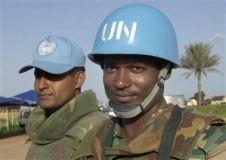UN removes 4 peacekeepers from Sudan after abuse
January 3, 2007 (UNITED NATIONS) — Four U.N. peacekeepers in southern Sudan have been sent home in the past year following investigations of alleged sexual abuse and the United Nations is looking into reports that more than 20 children were raped and abused, the U.N. spokeswoman said.
 Michele Montas said Wednesday the United Nations was “deeply concerned” by a report in a British newspaper alleging that U.N. personnel in Juba, the capital of southern Sudan, were involved in sexual exploitation and abuse and was trying to determine whether the allegations were new or involved existing cases already under investigation.
Michele Montas said Wednesday the United Nations was “deeply concerned” by a report in a British newspaper alleging that U.N. personnel in Juba, the capital of southern Sudan, were involved in sexual exploitation and abuse and was trying to determine whether the allegations were new or involved existing cases already under investigation.
The Daily Telegraph, citing an internal report by the U.N. children’s agency along with interviews with more than 20 victims of the purported abuse, reported that the alleged abuse began two years ago when the U.N. Mission in Southern Sudan, known as UNMIS, arrived to help maintain peace in the region after a more than two-decade civil war.
“The first indications of sexual exploitation emerged within months of the U.N. force’s arrival and The Daily Telegraph has seen a draft of an internal report compiled by the U.N. children’s agency UNICEF in July 2005 detailing the problem,” the paper reported on its Web site. “Evidence suggests that UNMIS staff may already be involved in sexual exploitation.”
A 14-year-old boy identified only as Jonas told the newspaper “I was sitting by the river the first time it happened.” A 13-year-old boy told the paper he was lured to a U.N. car with the offer of cash, abused and dumped by the side of a road.
Montas told reporters the UNICEF report “did not talk about sexual abuses from U.N. peacekeepers.”
“They spoke about sexual abuses on the part of the Sudanese military,” she said.
Nonetheless, Montas said, “the U.N. is very concerned about this issue and over and over again repeated its determination to end sexual abuse by peacekeepers.”
“The U.N. standard on this issue is clear – zero tolerance, meaning zero complacency and zero impunity,” she said.
The Office of Internal Oversight Services, the U.N.’s internal watchdog known as OIOS, has a team permanent based in Sudan, where over 11,000 peacekeepers, police and international civilian staff are based and it investigates all allegations of abuse. OIOS also has teams in Congo, Liberia and Haiti where the U.N. has other large peacekeeping operations.
“Over the past year, as a result of U.N. investigations, four UNMIS peacekeepers have already been repatriated,” Montas said. The nationalities of the peacekeepers were not released.
While allegations of abuse have dogged peacekeeping missions since their inception over 50 years ago, the issue was thrust into the spotlight after the United Nations found in early 2005 that peacekeepers in Congo had sex with Congolese women and girls, usually in exchange for food or small sums of money.
Jordan’s U.N. Ambassador Prince Zeid al Hussein wrote a report several months later that described the U.N. military arm as deeply flawed and recommended withholding the salaries of the guilty and requiring nations to pursue legal action against perpetrators. It said abuses had been reported in missions ranging from Bosnia and Kosovo to Cambodia, East Timor, West Africa and Congo.
The U.N. peacekeeping department instituted a new code of conduct for peacekeepers, new training for officers and all U.N. personnel, and reinforced messages against sexual abuse.
U.N. Assistant Secretary-General for Peacekeeping Jane Holl Lute said Tuesday night that the allegations could be true, but “these environments are ones in which it is difficult to ascertain the truth.”
She said she has personally spoken to the force commander and chief of staff in the U.N. mission in southern Sudan “and I know they are very well briefed on what U.N. policy is and have taken steps to implement that policy across the board in that mission.”
“But we don’t have the facts yet in this case, and we need to ascertain the facts and follow it through to appropriate resolution and take action if necessary,” she said.
Lute, who served in the U.S. Army for 16 years, said vigilance on this matter has to be “a constant factor of life when you’re rotating through 200,000 troops in as diverse environments as we do.”
(AP)
